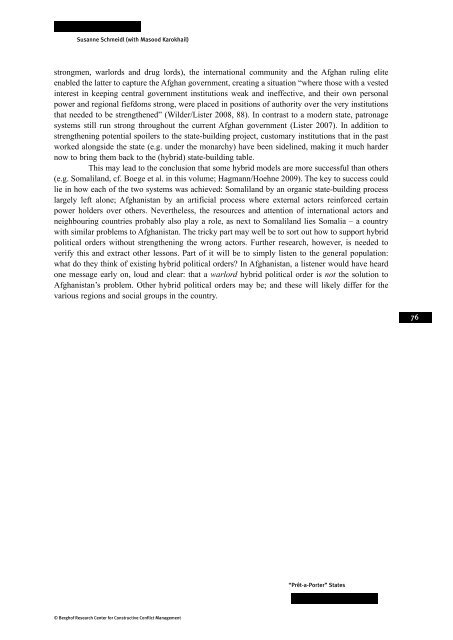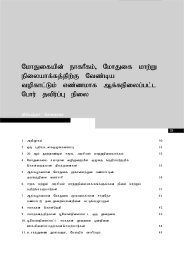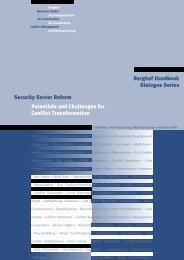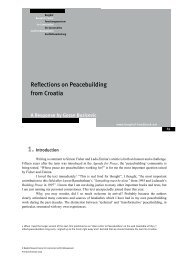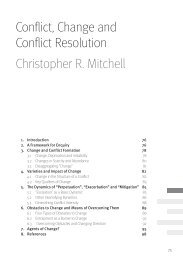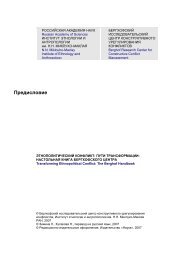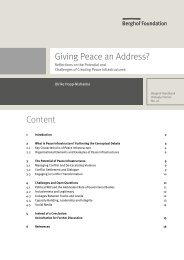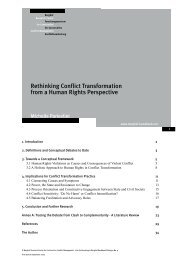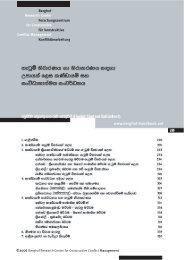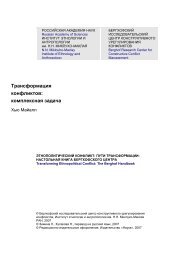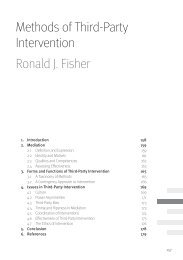Prêt-a-Porter States - Berghof Handbook for Conflict Transformation
Prêt-a-Porter States - Berghof Handbook for Conflict Transformation
Prêt-a-Porter States - Berghof Handbook for Conflict Transformation
You also want an ePaper? Increase the reach of your titles
YUMPU automatically turns print PDFs into web optimized ePapers that Google loves.
Susanne Schmeidl (with Masood Karokhail)<br />
strongmen, warlords and drug lords), the international community and the Afghan ruling elite<br />
enabled the latter to capture the Afghan government, creating a situation “where those with a vested<br />
interest in keeping central government institutions weak and ineffective, and their own personal<br />
power and regional fiefdoms strong, were placed in positions of authority over the very institutions<br />
that needed to be strengthened” (Wilder/Lister 2008, 88). In contrast to a modern state, patronage<br />
systems still run strong throughout the current Afghan government (Lister 2007). In addition to<br />
strengthening potential spoilers to the state-building project, customary institutions that in the past<br />
worked alongside the state (e.g. under the monarchy) have been sidelined, making it much harder<br />
now to bring them back to the (hybrid) state-building table.<br />
This may lead to the conclusion that some hybrid models are more successful than others<br />
(e.g. Somaliland, cf. Boege et al. in this volume; Hagmann/Hoehne 2009). The key to success could<br />
lie in how each of the two systems was achieved: Somaliland by an organic state-building process<br />
largely left alone; Afghanistan by an artificial process where external actors rein<strong>for</strong>ced certain<br />
power holders over others. Nevertheless, the resources and attention of international actors and<br />
neighbouring countries probably also play a role, as next to Somaliland lies Somalia – a country<br />
with similar problems to Afghanistan. The tricky part may well be to sort out how to support hybrid<br />
political orders without strengthening the wrong actors. Further research, however, is needed to<br />
verify this and extract other lessons. Part of it will be to simply listen to the general population:<br />
what do they think of existing hybrid political orders? In Afghanistan, a listener would have heard<br />
one message early on, loud and clear: that a warlord hybrid political order is not the solution to<br />
Afghanistan’s problem. Other hybrid political orders may be; and these will likely differ <strong>for</strong> the<br />
various regions and social groups in the country.<br />
© <strong>Berghof</strong> Research Center <strong>for</strong> Constructive <strong>Conflict</strong> Management<br />
“<strong>Prêt</strong>-a-<strong>Porter</strong>” <strong>States</strong><br />
76


